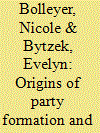| Srl | Item |
| 1 |
ID:
123011


|
|
|
|
|
| Publication |
2013.
|
| Summary/Abstract |
Which new parties entered national parliaments in advanced democracies over the last four decades and how did they perform after their national breakthrough? This article argues that distinguishing two types of party formation (that facilitate or complicate party institutionalisation) helps to explain why some entries flourish, while others vanish quickly from the national stage. New parties formed by individual entrepreneurs that cannot rely on ties to already organised groups are less likely to get reelected to parliament after breakthrough than rooted newcomers. This hypothesis is tested on a newly compiled dataset of new parties that entered parliaments in 17 advanced democracies from 1968 onwards. Applying multilevel analyses, the factors that shape newcomers' capacity to reenter parliament after breakthrough are assessed. Five factors have significant effects, yet affect party performance only in particular phases: both a party's electoral support at breakthrough and its operation in a system with a strong regional tier increase the likelihood of initial reelection. In contrast, a distinct programmatic profile, the permissiveness of the electoral system and easy access to free broadcasting increase a party's chance of repeated reelection. Only formation type significantly affects both phases and does so most strongly, substantiating the theoretical approach used in this article.
|
|
|
|
|
|
|
|
|
|
|
|
|
|
|
|
| 2 |
ID:
171202


|
|
|
|
|
| Summary/Abstract |
In this paper, we study how political parties react to democratic transitions. We find that the structure of legislators’ social networks plays a critical role in shaping their political interactions during the transition period, and consequently, the post-transition party systems that emerge. We focus on the Korean case, where the incumbent authoritarian party merged with one of its pro-democracy opponents to create a powerful and enduring conservative party under democratic rule. Using a novel individual-level dataset on all legislative members during the transition, we find that the merger was facilitated by dense social networks linking members of the merged parties, which increased trust across the parties and reduced the difficulty of a merger. Conversely, we find that the paucity of ties linking pro-democracy parties hindered their long-term cooperation, despite their shared ideologies and policy goals. The study complements existing theories by providing a network-based explanation for the weakly institutionalized political party system that has characterized Korean politics since democratization.
|
|
|
|
|
|
|
|
|
|
|
|
|
|
|
|